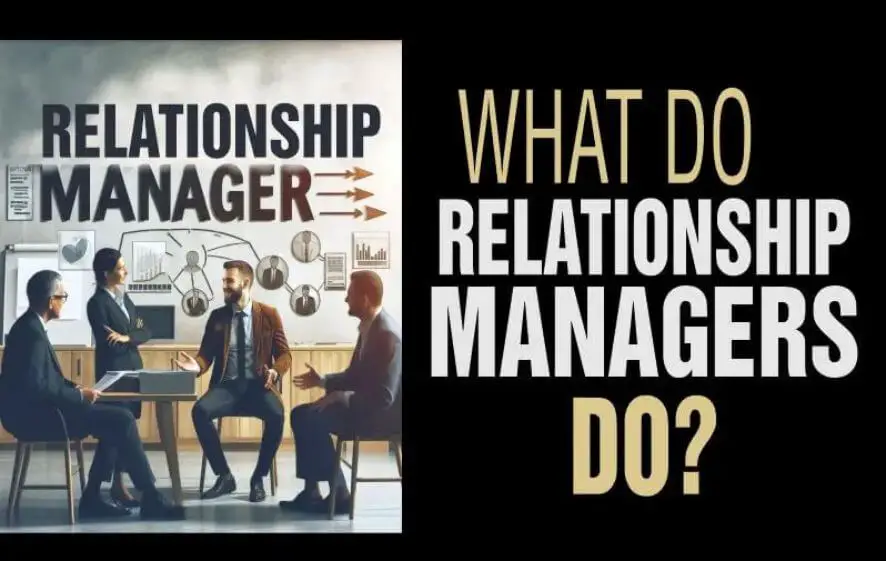Last updated on July 14th, 2024 at 05:54 pm
Understand the job descriptions of the relationship manager who plays a central role in ensuring client satisfaction and business growth and how to become one.
Building and nurturing strong relationships is one of the most critical pillars of success for any business.
Whether it’s with clients, partners, or stakeholders, maintaining a healthy rapport is crucial.
We have simplified the various responsibilities and initiatives undertaken by a relationship management position in this article, shedding light on the significance of his role in encouraging long-lasting connections.
Table of Contents
- What is a Relationship Manager?
- What Does a Relationship Manager Do?/ Job Description
- The Impact of Effective Relationship Management
- How to Become a Relationship Manager
- Frequently Asked Questions
- Conclusion
What is a Relationship Manager?
A relationship manager is a professional responsible for managing and maintaining relationships with clients, vendors, and key stakeholders.
They serve as the primary point of contact and are entrusted with building trust, addressing concerns, and ensuring client satisfaction.
Types of Relationship Managers
- Client relationship management
- Business relationship management
- Customer relationship management
- Community relationship management
- Partner Relationship Management
Client Relationship Manager: A client relationship management position is a pivotal figure responsible for nurturing and maintaining strong, mutually beneficial relationships between a company and its clients.
This role involves understanding clients’ needs, ensuring their satisfaction, and identifying growth opportunities.
Business Relationship Manager: A business relationship management position is a professional who acts as a liaison between a company and its external partners, focusing on building and maintaining positive relationships.
They facilitate communication, understand partner needs, and align business objectives to ensure mutual success.
BRMs play a key role in driving collaboration, trust, and long-term partnerships.
Customer Relationship Manager: A customer relationship management position is a professional dedicated to nurturing and managing relationships between a company and its customers.
They utilize strategies to enhance customer satisfaction, retention, and loyalty.
By understanding customer needs and preferences, they aim to deliver personalized experiences and drive long-term value for both the customer and the company.
Community Relationship Manager: A community relationship management position is responsible for promoting positive connections between an organization and the community it serves.
They engage with local stakeholders, address community concerns, and develop initiatives to support and strengthen the relationship between the organization and the community.
Partner Relationship Manager: A manager in partnership relationships is responsible for nurturing and maintaining positive relationships with the partners of a company. They work to understand partner needs, align business objectives, and facilitate collaboration to ensure mutual success and long-term partnerships.
Related: What is Meant by Partner Relations?
What Does a Relationship Manager Do?/ Job Description

To effectively carry out their responsibilities, relationship managers must possess exceptional communication and interpersonal skills.
These professionals must be empathetic listeners, leaders, and problem solvers, and possess an in-depth understanding of their client’s needs and requirements.
The core competencies of relationship management positions are the skills, knowledge, and attributes that enable them to effectively build and maintain relationships with clients.
These competencies are essential for relationship management positions to understand and meet the needs of their clients, earn their trust, and enhance client satisfaction.
1. Relationship Building
Relationship managers need to have excellent interpersonal skills to build strong and meaningful relationships with their clients.
They should be able to establish rapport, listen actively, and communicate effectively to understand the client’s requirements and provide appropriate solutions.
2. Client Management
He should possess strong client management skills to effectively handle client portfolios, including client onboarding, account reviews, and resolving client concerns.
It involves managing client expectations, identifying opportunities to cross-sell or upsell, and ensuring high client satisfaction levels.
Related: Understanding Relationship Management in Emotional Intelligence
3. Account Management
Another essential responsibility is overseeing account management.
This includes proactively identifying growth opportunities, upselling, and cross-selling relevant products or services to existing clients.
Moreover, they work closely with other departments to ensure timely delivery and quality customer service.
4. Financial Knowledge
He should have a sound understanding of financial products, investment strategies, and market trends.
This knowledge enables them to offer appropriate financial advice and solutions to their clients, aligning with their financial goals and risk tolerance.
5. Problem-solving and Conflict Resolution
He needs to be adept at problem-solving, as clients may face various financial challenges or have specific needs.
They should be able to analyze complex situations, identify suitable options, and provide innovative solutions to address the client’s requirements effectively.
They often find themselves handling conflicts or resolving issues that may arise during the relationship.
They act as mediators, listening to both sides and facilitating open communication to reach a resolution that satisfies all parties involved.
6. Teamwork
They collaborate with various internal teams, including product specialists, operations, and risk management.
Strong teamwork skills are essential for effective collaboration, coordination, and ensuring seamless delivery of services to clients.
7. Client Retention and Business Development
They play a vital role in retaining existing clients and acquiring new ones.
They should have strong business development skills to identify potential clients, grow their client base, and expand revenue streams for the organization.
This includes networking, maintaining a robust referral network, and consistently delivering value to clients.
8. Adaptability
They should be adaptable and open to change as the financial market, and client needs evolve.
Also, they should be comfortable working in dynamic environments, embracing new technologies, and updating their knowledge and skills to stay relevant in the industry.
9. Client Acquisition and Onboarding
They are often tasked with identifying potential clients, assessing their suitability, and developing strategies to acquire new partnerships.
Moreover, they oversee the onboarding process, ensuring seamless integration into the organization.
Related: Demystifying Relationship Management in Banking
The Impact of Effective Relationship Management

Of course, there are visible impacts of effective relationship management as you can see below:
Enhanced Customer Satisfaction: A skilled relationship manager can significantly impact customer satisfaction levels. By understanding client needs, preferences, and pain points, they can tailor solutions that precisely match their requirements, resulting in increased loyalty and long-term partnerships.
Long-term Business Growth: The efforts of a manager in relationships can contribute directly to the overall growth of an organization. By nurturing existing relationships and building new ones, they can expand the client base, increase revenue, and drive business growth.
Mitigation of Risks: Another impact of a manager in business relationships is risk mitigation. By staying closely engaged with clients, they can detect and address potential issues promptly, mitigating risks and avoiding any major setbacks.
How to Become a Relationship Manager

Becoming a relationship manager requires a combination of skills, experience, and qualifications.
Here are some steps you can take to become one:
1. Earn a Bachelor’s Degree
Most companies prefer candidates with a bachelor’s degree in business, finance, marketing, or a related field.
This will provide you with the foundational knowledge needed for the role.
2. Gain Relevant Work Experience
To become a successful relationship manager, it is important to have experience in sales, marketing, or client relationship management.
Look for internships, entry-level positions, or volunteer opportunities in these areas to gain practical experience.
3. Develop Strong Communication Skills
Relationship managers need excellent communication skills to build and maintain relationships with clients.
Work on developing your verbal and written communication skills, active listening, and diplomacy.
4. Build a Professional Network
Networking is important in a relationship management role. Attend industry events, join professional organizations, and connect with professionals in your field to expand your network.
Networking can help you find job opportunities and gain insights from experienced professionals.
5. Get certified
Depending on the industry or organization you want to work for, obtaining relevant certifications can enhance your chances of securing a relationship management position.
For example, in the financial industry, certifications such as Certified Financial Planner (CFP) or Chartered Financial Analyst (CFA) can be beneficial.
6. Continuously Learn and Stay Updated
The role of a relationship manager is ever-evolving. Stay updated on industry trends, market changes, and new technologies.
Continuously learning and adapting to changes will make you a valuable asset to your organization and clients.
7. Showcase Your Skills and Attributes
When applying for relationship management positions, highlight your relevant skills and attributes such as strong interpersonal skills, problem-solving abilities, and a customer-focused mindset.
Provide examples of how you have successfully managed client relationships in the past.
8. Gain Industry-specific Knowledge
Depending on the industry you want to work in, gaining industry-specific knowledge and expertise can be beneficial.
Understand the unique challenges, regulations, and opportunities within your target industry.
9. Develop Empathy and Emotional Intelligence
Managing business relationships requires understanding and empathizing with clients’ needs and emotions.
Developing empathy and emotional intelligence will help you build trust and maintain long-term relationships with your clients.
10. Be proactive and Take Initiative
Relationship management is a proactive role. Be proactive in anticipating clients’ needs, offering solutions, and going the extra mile to provide exceptional service.
Taking initiative and being proactive will set you apart from other candidates.
Frequently Asked Questions
Is relationship manager a high position?
Yes, managing business relationships is often a high-level position responsible for managing important business relationships and driving strategic partnerships.
What does a relationship manager do in a business?
A relationship management position in a business nurtures and maintains relationships with clients, partners, or the community to ensure mutual success and satisfaction.
What is Relationship Management work?
Relationship management involves overseeing and optimizing interactions between a business and its clients, partners, or community to achieve shared goals and sustained success.
What is the role of the relationship manager?
The role of relationship management is to facilitate communication, understand needs, align objectives, and build trust to foster successful and enduring relationships.
Conclusion
In a world where strong relationships are the lifeblood of any successful business, relationship management plays a crucial part in nurturing connections and achieving client satisfaction.
Through their diverse skill set, relationship management positions drive growth, resolve conflicts, and ensure clients’ needs are met.
With their dedication and commitment, they emerge as ambassadors for the business, laying the foundation for long-standing and prosperous partnerships.
References:
- https://resources.workable.com/relationship-manager-job-description
- https://www.seek.com.au/career-advice/role/relationship-manager
- https://www.careersinafrica.com/role/relationship-manager-corporate-banking/
- https://www.myskillsfuture.gov.sg/content/student/en/preu/world-of-work/occupation/occupation-detail.Relationship-Manager-(Retail-Banking)-94941.html
Pyo Merez (PsyD) is a distinguished adolescent and adult psychologist at the forefront of mental health advocacy.
With expertise in cognitive and developmental psychology, focusing on social relationships, cultural contexts, and individual differences, Pyo has dedicated his career to empowering adolescents and adults.
As a sought-after speaker and panelist, Pyo shares invaluable insights on issues affecting young people, contributing to a deeper understanding of mental health and well-being in today's society.


